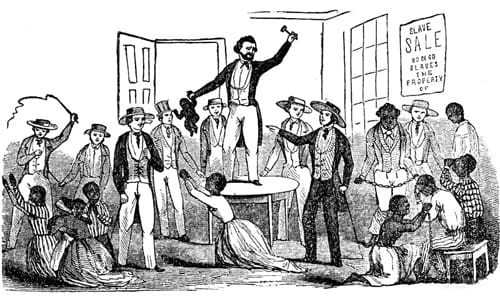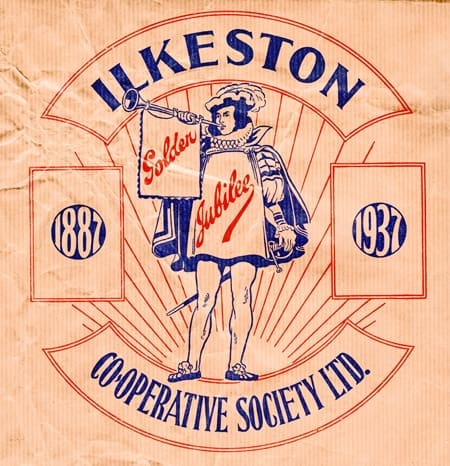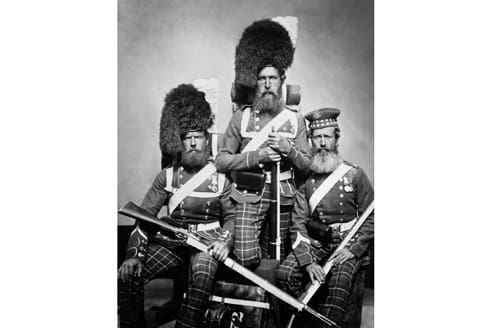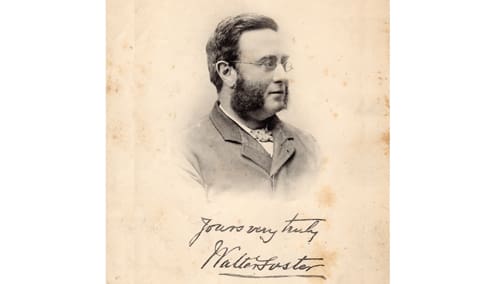( A longer read) An Ilkestonian’s experience – From material provided by John Paling
Thomas Jackson (1806-1878) was born in Birmingham but grew up in Ilkeston. His father, John, was a rope maker. Thomas and his two brothers Edward and Henry emigrated to America with their father in 1829, later being joined by John’s wife and three daughters. Thomas stayed in touch with his family in England and this led to an extraordinary collection of letters written around the time of the American Civil War.
The family settled in Reading, Pennsylvania USA and Thomas set up a rope making business. Eight years later, Thomas’s English wife and mother of six of his children, Matilda, died. He did not remarry. Thomas wrote with nostalgia about his memories of England and repeatedly expressed his wish to return to see his old friends. The only time he seems to have made the journey was in 1842. Towards the end of his life, he “built a nice new house for my daughter and her husband and. . . I have been making my home with them for the last two years (1869). They have three very nice little boys who are very fond of Grandfather and afford him a great deal of comfort.” Thomas Jackson died in that house on August 6th, 1878.
Thomas left long letters recording first hand his experiences during the American Civil War. At some point early in his time in America, he witnessed an auction of enslaved people and that stirred him to become a lifetime advocate for the abolition of slavery and a strong supporter of Abraham Lincoln. He was particularly angry that many leading British politicians seemed willing to overlook the immorality of slavery in favour of protecting their cotton supplies. In an effort to correct that, he started to write letters which had virtually no family pleasantries but contained great detail and personal comment about the war and the horrors of slavery. He sent these letters to his British cousins with the request that they should try to get them published in the local newspapers. The Ilkeston Pioneer of September 11th 1862 did indeed print one of his letters.

Thomas’s ropewalk prospered. He employed more and more people and finally “amassed quite a fortune.” However he had to start totally from scratch on three different occasions, in 1841 and again in 1850 when his premises were destroyed by flood and in June 1873 when the ropeworks was totally destroyed by fire. Arson was suspected. The whole loss was over $50,000 (Nearly £600,000 in today’s money). Once more, aged 57, Thomas had to start over again. In 1875 his son Henry H Jackson was admitted as a partner and continued to run the business after Thomas died. The Jackson Rope Works came to employ over 150 people in Reading and continued to operate for over 150 years until it finally closed in 1966.
From the Ilkeston Pioneer :
The following letter is from the pen of Mr. Thomas Jackson, who was a resident at the Ropewalk in this town, and who will doubtless be remembered by many of our old townsmen.
“Fifty years ago my father used to take me on his knee and tell me of America. He described it as a far-off land, “flowing with milk and honey, where every man sat under his vine and under his fig tree, and none to make him afraid.” He praised the Government as the only one then free, and based upon the sovereignty of [the] whole people […]. He filled my boyish fancy with such glowing ideas of free America, that I determined to go to that highly privileged and prosperous country when I became a man, and, my own master. More than 33 years ago I emigrated to America, and settled in one of the most prosperous of the free States. I was kindly welcomed and found many good men and kind friends. I had to work hard, but I soon had a good home, acquired property, and was prosperous and happy. I saw nothing of slavery, […] but about 12 years after I came to America I had occasion to visit a large Southern city on business. There I saw a crowd of men in one of the principal streets. On going to see what brought them together, I found an auction of slaves in full operation. I suppose I saw 15 or 20 sold, of all shades of colour from black to three-quarters white. Then they brought out a good-looking, well-dressed, modest, and the most interesting young woman, about 23 or 24 years old, and, to all appearances to me, as white as my own English wife. She had a little daughter about three years old by her side, and a beautiful babe of about a year old in her arms […] The common law of England makes the status of the child to depend upon the status of the father: but about 1740 the Legislatures on the American slave colonies reversed the law, and made the status of the child dependent upon the status of the mother. […] So this woman […] and her little ones were placed on the auction block and put up for public sale to the highest bidder. The auctioneer began —
“Gentlemen, I have a very interesting lot to offer you now. This woman is a good housekeeper, good laundress, a good sower [sic] and quick with her needle, a good and careful nurse, kind to children, good tempered, trustworthy, and a very confidential servant every way capable of taking the whole charge of a gentleman’s household. She is not being used to hard work, but she is young and a very valuable breeder, she has two fine healthy children. Gentleman, gave me a bid. How much for the lot?” The “Gentlemen” were an odd looking crowd, most of them a hard featured set of dirty mouthed, rum-drinking tobacco chewers, […] [and] gloated over the poor woman and her babes they were bidding for. And there stood this hapless daughter of slavery […] under the rude gaze of these of these republican “gentlemen” — these slave loving champions of liberty, liable to become the property, and entirely subject to the power and the lust of the grossest brute among them, if he bid high enough!
There stood this most interesting young American mother, with her mild large, dark, tearful eyes […], evidently feeling her degradation, the very picture of desolation and despair, pressing her beautiful babe to her bosom almost convulsively, her little daughter clinging to her dress in alarmed wonderment at the strange scene she was for the first time a part of. […] Great God! Thought I, Is this the land of civilization, freedom, and just laws? Is this “the land of the free and the home of the brave?” […] I looked with appalled amazement on that horrible sight only a few minutes; but in those few minutes I dreamed over again my 30 years dream of American liberty, and found its but a dream! I walked away with a heavy heart, a wiser and much sadder man than I was before. That was 20 years ago. I have lived in America ever since; but from that hour all respect for the Government, and the people who uphold it, was gone. I have continued to look upon the pro-slavery party — and they are a great majority North as well as South — with a perfect loathing.

The barkeeper of the hotel I stayed at knew the ‘owner’ of this poor young woman, and said that the owner was the father of her children. He had become tired of her, wished a change, and all the favour he showed her was — to send her — [and his] two children to auction, to be sold together in one lot, and not separated while he owned them. […] American laws and institutions encourage him to send his children and their mother to the slave mart, and put their price in his pocket to minister to continued luxury, laziness, licentiousness, and slavery! […] But slavery must perish, with all its abettors. […] The country in all directions is being desolated by fire and sword, shot and shell. Virginia — the mother of five American presidents and millions of American slaves — that has been breeding the poor victims of human villainy, with which to supply the slave markets of her sisters in sin for nearly two hundred years, is now the main battle ground of the vast contending armies of white-faced American aristocracy, and will be laid waste and desolated entirely before the fighting is all over. Such are the historical retributions of Providence! Such are the dealings of almighty and eternal justice!
Thomas Jackson, Philadelphia, August 12th, 1862
Editor’s note : Many thanks to John Paling who maintains a website containing many of Thomas Jackson’s letters for giving us permission to use material from his site thomasjacksonletters.com – well worth a visit.



